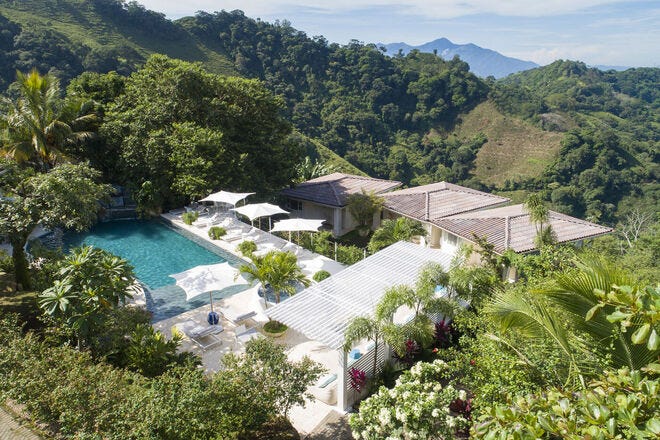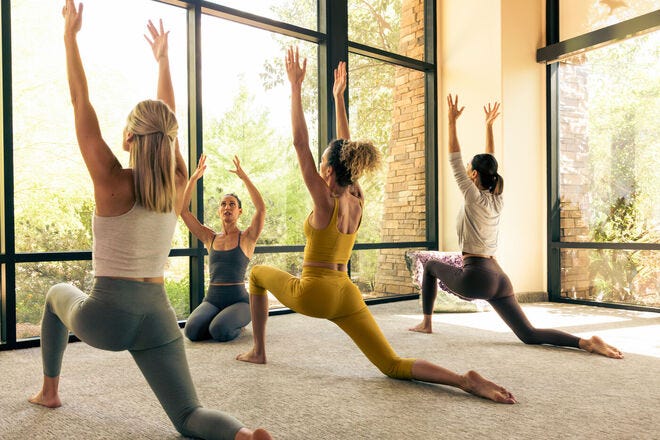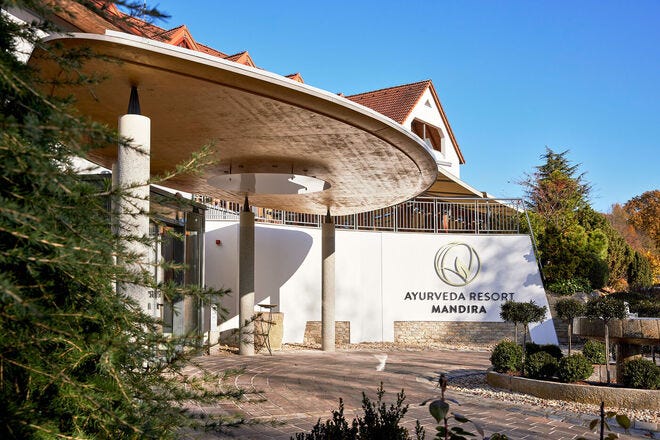Menopause retreats and programs help women thrive with classes, spa treatments, and more — Photo courtesy of Canyon Ranch
Menopause is no longer something to discuss quietly behind closed doors. As a wellness trend, menopause retreats are steadily making their way into the tourism industry, with more midlife offerings at hotels and resorts around the globe.
According to the Global Wellness Institute, menopause, longevity, and art-centric retreats are among the top trending wellness tourism experiences. Today, travelers seek more from their vacations, and women’s wellness retreats are one way to add value to a getaway. Why escape a hot day on a beach when you can diminish the effects of hot flashes at a spa resort?
What is a menopause retreat?
A menopause retreat is an immersive experience typically held at a wellness-focused resort where women can learn more about the midlife transition period through expert-led sessions. Some retreats also include personalized evaluations and consultations.
“[Menopause] is one of the most important phases that a woman will go through, and we cannot afford to not bring attention to the best ways to improve our lives, decrease symptoms, and also help build our bodies for the next 30 to 40 years,” says Dr. Jessica Shepherd, chief medical officer of Hers and author of “Generation M: Living Well in Perimenopause and Menopause.”
What to expect at a menopause retreat
Attendees can expect sessions led by an OB-GYN or hormone expert and opportunities for women to ask questions about this new stage in life. Women can also build community and share their experiences with others who are going through an often isolating and overwhelming phase.
“One of the biggest things we do so well as women, and it’s in our biological nature, is to connect with each other,” says “The Menopause Reset” author Dr. Mindy Pelz. “We’re creating that connection, and it could be totally subconscious. Women intuitively know that something happens when ‘I’m with my best friend’ or when ‘I’m with a group of women lifting me up.’ I feel better. I’ll pay money to put myself in those environments.”
Where to go on a menopause retreat
Whether you’re open to traveling somewhere close to home or abroad, Pelz suggests looking for a retreat that lifts you up and doesn’t apply a one-size-fits-all approach. “You want it to be a nurturing environment where you learn how you, specifically, can help yourself with your menopausal symptoms, and you do that through lifestyle,” she adds.
Here are five menopause retreats offered at hotels and resorts around the world.
The Big M: Mastering Menopause, The Retreat Costa Rica
 The seven-night menopause retreat at The Retreat Costa Rica aims to balance hormones — Photo courtesy of The Retreat Costa Rica
The seven-night menopause retreat at The Retreat Costa Rica aims to balance hormones — Photo courtesy of The Retreat Costa Rica
Set against Costa Rica’s lush landscapes, The Retreat Costa Rica offers a package for women experiencing menopause, perimenopause, or postmenopausal symptoms. The Big M: Mastering Menopause program features physical development through classes that focus on menopause belly and Kegel exercises, six spa treatments designed to harmonize and balance hormones, a cooking class to learn recipes you can cook at home, and an anti-inflammatory menu with ingredients sourced from the organic farm.
Explore: Where to book a hot springs vacation this winter
Mindful Menopause Journey, Six Senses, India and Portugal
 Community and celebration are pillars of menopause retreats at Six Senses — Photo courtesy of Six Senses Ibiza
Community and celebration are pillars of menopause retreats at Six Senses — Photo courtesy of Six Senses Ibiza
Six Senses is known for its emphasis on wellness and sustainability. Offered at the Six Senses Vana in Uttarakhand, India, Mindful Menopause Journey is a seven-night program that highlights the emotional, mental, and physical symptoms that women can expect during the transitional phase. The retreat offers tools and techniques to mitigate these systems and thrive during the menopausal years.
At Six Senses Douro Valley in Portugal, Pelz will lead a menopause retreat in spring 2025. Check the website for updated information.
Thrive Through Menopause, Canyon Ranch Tucson, Arizona
 Menopause retreats at Canyon Ranch Tucson are offered throughout the year — Photo courtesy of Canyon Ranch
Menopause retreats at Canyon Ranch Tucson are offered throughout the year — Photo courtesy of Canyon Ranch
Canyon Ranch is one of the pioneers in wellness resorts. The famed spa and resort in Tucson, Arizona, offers a six-night program focused on menopause called Thrive Through Menopause Immersion. The program, offered several times a year, features insightful presentations led by physicians and experts, fitness experiences, access to the resort’s classes and facilities, accommodations, meals, and transportation.
Participation also includes complimentary tests and services such as a DEXA scan measuring body composition and bone density, physician consultations, a bloodwork and hormone panel, and glucose tracking for weight management.
Women’s Weeks, Cal-a-Vie Health Resort, California
 Cal-a-Vie’s wellness and menopause retreats feature fitness classes and more — Photo courtesy of Cal-a-Vie Health Spa
Cal-a-Vie’s wellness and menopause retreats feature fitness classes and more — Photo courtesy of Cal-a-Vie Health Spa
San Diego’s Cal-a-Vie Health Resort offers several women’s wellness retreats, including designated Women’s Weeks throughout the year. These week-long sessions include programming led by registered dietitians, such as navigating perimenopause with a functional approach, nutrition protocols for skin health and aging gracefully from within, self-care tips, and fitness classes for a more balanced lifestyle.
Hotels & Resorts: Aufguss sauna, the next big wellness trend you need to know about
Hormone Balance Retreat, Mandira Ayurveda Resort, Austria
 Both women and men are welcome at the hormone balance retreat in Wagerberg, Austria — Photo courtesy of Ayurveda Resort Mandira
Both women and men are welcome at the hormone balance retreat in Wagerberg, Austria — Photo courtesy of Ayurveda Resort Mandira
The 10-night Hormone Balance Retreat, which takes place at Mandira Ayurveda Resort in Wagerberg, Austria, provides a personalized Ayurvedic approach for both women and men. In Ayurveda medicine, midlife signals a transition into wisdom for both genders.
Meals offered feature regional ingredients and herbs to help invigorate and detox the body. In addition to yoga and meditation classes and access to the thermal springs on the property, guests have access to health experts who use diagnostic and preventative therapies as they enter this chapter of their lives.
This post was originally published on here







